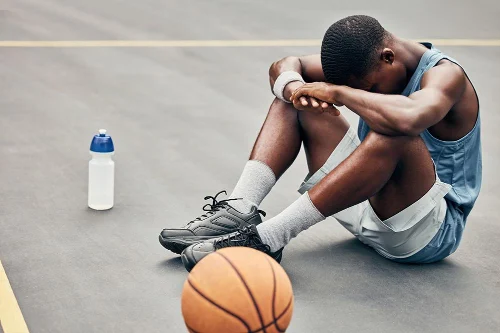Coping with Performance Anxiety in Sports
Performance anxiety is a common experience for many athletes, regardless of their level of competition. The pressure to perform well, fear of failure, and the anxiety that arises before or during competition can be overwhelming. Understanding how to manage and cope with performance anxiety is essential for maintaining mental health, focus, and peak performance. Athletes often face the challenge of balancing the physical demands of their sport with the psychological stress that accompanies competition. Performance anxiety can manifest in various forms, such as increased heart rate, muscle tension, negative self-talk, or a sense of dread before a game. These physical and emotional responses can impair focus, disrupt concentration, and ultimately affect performance. However, there are several psychological strategies that athletes can use to cope with anxiety, reduce stress, and regain control over their thoughts and emotions.
Best Techniques to Manage Anxiety
One of the most effective techniques for managing performance anxiety is mindfulness and relaxation training. Mindfulness involves staying present in the moment and being aware of one’s thoughts, feelings, and physical sensations without judgment. This practice helps athletes to break free from the cycle of worry and fear about future outcomes, enabling them to focus on the task at hand. Techniques such as deep breathing, progressive muscle relaxation, and visualization can help athletes calm their nerves, reduce physiological symptoms of anxiety, and restore mental clarity. Deep breathing exercises, for instance, can help athletes control their breath and slow down their heart rate, creating a sense of calm before and during performance. Visualization, or mental imagery, involves mentally rehearsing successful performances, allowing athletes to prepare their minds for a positive outcome and build confidence in their abilities.
Another essential strategy for coping with performance anxiety is cognitive restructuring. This technique involves identifying and challenging negative thoughts or irrational beliefs that contribute to anxiety. For example, an athlete may have the thought, “If I don’t win this match, I will disappoint everyone,” which can create excessive pressure and anxiety. Cognitive restructuring helps athletes reframe these thoughts by focusing on more realistic and positive outcomes, such as, “I can only control my effort, not the result.” By altering these unhelpful thoughts, athletes can reduce the emotional intensity of their anxiety and shift their focus to what is within their control, improving their mental resilience. Coaches and sports psychologists often work with athletes to develop these skills, providing tools to reframe negative thinking patterns that may lead to stress or self-doubt.
In addition to cognitive strategies, goal setting is a powerful tool for managing performance anxiety. When athletes set clear, achievable goals, it helps them to stay focused on the process rather than the outcome. Focusing on short-term goals, such as improving technique or executing a specific play, can reduce the overwhelming pressure that comes from focusing solely on winning. By breaking down performance into smaller, manageable tasks, athletes can maintain a sense of control and accomplishment, even if they don’t achieve the final result they hoped for. This process can also help to reduce the fear of failure, as athletes learn to view challenges as opportunities for growth and development rather than as threats to their self-worth. Goal setting encourages athletes to keep their expectations realistic and fosters a mindset of continuous improvement.
Another important aspect of coping with performance anxiety is social support. Having a strong support system, including coaches, teammates, friends, and family, can help athletes manage stress and anxiety. Encouragement, positive reinforcement, and shared experiences can help athletes feel less isolated in their struggles. Teammates, in particular, can be a valuable source of emotional support, offering reassurance and camaraderie during difficult moments. Furthermore, coaches who understand the psychological challenges athletes face can provide guidance and reassurance, helping athletes navigate performance anxiety with confidence. Social support also plays a role in normalizing the experience of anxiety, as athletes realize they are not alone in feeling nervous or fearful before competition.
Techniques for Coping with Performance Anxiety
| Technique | Description | Impact on Performance |
|---|---|---|
| Mindfulness and Relaxation | Involves focusing on the present moment and using techniques like deep breathing and progressive muscle relaxation to reduce anxiety. | Helps athletes manage physical symptoms of anxiety and maintain focus during performance. |
| Cognitive Restructuring | Involves identifying and challenging negative thoughts and beliefs, replacing them with more realistic and positive perspectives. | Reduces the emotional intensity of anxiety and helps athletes stay focused on controllable factors. |
| Goal Setting | Setting short-term, achievable goals to focus on the process rather than the outcome. | Helps athletes stay motivated, reduce pressure, and maintain a sense of control. |
| Visualization | Mentally rehearsing successful performances or specific movements to build confidence and mental clarity. | Enhances confidence and prepares athletes mentally for success. |
| Social Support | Seeking encouragement and reassurance from teammates, coaches, and family members. | Provides emotional stability and reinforces positive thinking. |
Key Strategies for Overcoming Performance Anxiety
- Practice Deep Breathing: Use controlled breathing techniques to calm the body and reduce anxiety before and during competition.
- Challenge Negative Thoughts: Reframe irrational or self-critical thoughts to reduce pressure and enhance focus.
- Set Clear, Achievable Goals: Focus on specific, short-term objectives to stay grounded and reduce overwhelming pressure.
- Visualize Success: Use mental imagery to envision successful outcomes and boost confidence.
- Seek Support: Rely on teammates, coaches, and loved ones for emotional support and encouragement.
In conclusion, while performance anxiety is a common challenge for athletes, it is a manageable one. By utilizing psychological strategies such as mindfulness, cognitive restructuring, goal setting, and visualization, athletes can effectively cope with the stress and fear that come with competition. With practice, these techniques not only help reduce anxiety but also enhance overall performance, allowing athletes to reach their full potential under pressure.

